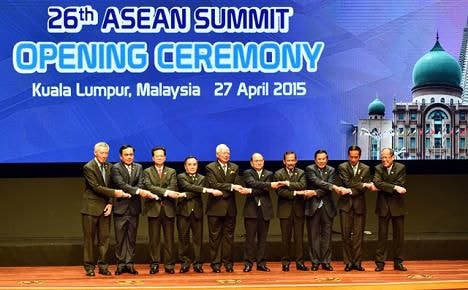Common voice on traditional security issues
(Baonghean) - From May 11, Nghe An Newspaper opens the column "Towards the ASEAN Community" every Monday to provide more information about the advantages and challenges when Southeast Asian countries form a common community on December 31, 2015.
The first issue will summarize the development process of the ASEAN community as well as assess the challenges and tasks ahead...
 |
| ASEAN senior officials on the eve of the 26th ASEAN Summit |
Nearly five decades ago (August 8, 1967), five out of ten Southeast Asian countries, including Indonesia, Malaysia, Singapore, Thailand, and the Philippines, announced the establishment of the Association of Southeast Asian Nations. After nearly five decades of ASEAN development, it is easy to see the changes, especially in terms of organization with 10 countries and two observers (Papua New Guinea, East Timor).
For Vietnam, immediately after the country's reunification, we expanded our relationship with ASEAN member countries with the desire to become an official member of the Association of Southeast Asian Nations. That relationship has developed rapidly both bilaterally and multilaterally. And on July 28, 1995, in the capital Bandar Seri Begawan of Brunei, Vietnam officially became the 7th member of ASEAN. This event is a milestone on the path of regional and international integration, bringing our country forward on the path of building a prosperous Vietnam, a strong country, a fair, democratic and civilized society.
In the history of ASEAN's development, especially in recent times, ASEAN has played an active role in protecting peace, stability, and regional security cooperation, and has been recognized and supported by countries, especially partner countries and major countries, for its central role in ASEAN. It should be noted that ASEAN's criteria in the political-security field are very clear and are expressed in the ASEAN Charter: "ASEAN is not a military alliance". However, the potential threat of force from neighboring China will probably make the ASEAN community need a more effective solution than it is now.
For many years, China has claimed sovereignty over almost the entire East Sea, continuously using force to impose its maritime claims, despite the sovereignty claims of countries such as Vietnam, the Philippines, Malaysia and Brunei. Some of China's actions in the East Sea that have caused outrage in the region and the international public in recent times are the dispute over the Scarborough Shoal, which the Philippines claims sovereignty over; brazenly sending the HD981 drilling rig deep into Vietnam's 200-nautical mile exclusive economic zone and continental shelf for two and a half months;...
Recently, China has been taking increasingly bold actions in the issue of sovereignty disputes over Dien Dong. Specifically, Beijing claims that Vietnam has expanded and reclaimed large-scale land on islands and reefs that, according to China, Vietnam "occupies" in the East Sea. Recently, on May 7, Chinese Foreign Ministry spokeswoman Hua Chunying brazenly declared that the country does not rule out the possibility of establishing an Air Defense Identification Zone (ADIZ) over disputed waters and islands in the East Sea.
Obviously, if the above scenario occurs, it will put the security, politics and economy of the entire region in danger. Finding a solution to preserve regional security, peace and stability is an extremely urgent issue for the ASEAN community. Putting aside individual interests, aiming for a bloc that develops together stably, strengthens ties and supports each other is the key to raising the common voice of the whole bloc. Only then will the community's viewpoints and perspectives have weight in the international arena, enough to confront the dangers that threaten stability and common prosperity.
Southern Scenery






